Iranian Behind 2009 Crackdowns Appointed CEO Of Sports Body
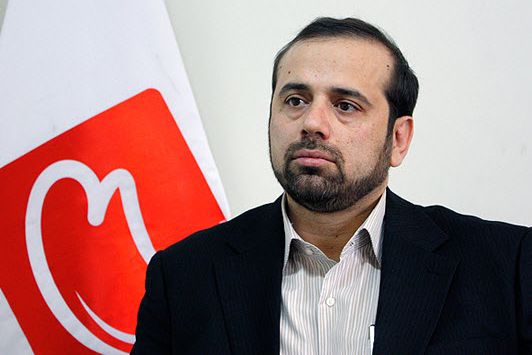
Kioumars Hashemi, the Iranian Minister of Sports and Youth, has appointed a security official as the new CEO of the Sports Facilities Development and Maintenance Company.

Kioumars Hashemi, the Iranian Minister of Sports and Youth, has appointed a security official as the new CEO of the Sports Facilities Development and Maintenance Company.
Hossein Tala's appointment has sparked criticism due to his involvement in suppressing the 2009 protests as governor of Tehran. The protests erupted following the announcement of Mahmoud Ahmadinejad's victory in the presidential elections, amid widespread allegations of electoral irregularities.
His actions during the protests and his alleged involvement in the suppression of dissent led to sanctions imposed by the European Union in 2011.
Before his tenure as governor, Tala held a position as the deputy political officer at the Tharallah headquarters of the Islamic Revolutionary Guard Corps. The Tharallah headquarters played a pivotal role in quelling protests and uprisings in Tehran.
The 2009 protests, also known as the Green Movement, marked a significant moment in the country's recent history. Sparked by allegations of election fraud following the controversial re-election of President Mahmoud Ahmadinejad, masses of Iranians took to the streets to voice their dissatisfaction with the government.
The protests, which began peacefully, quickly escalated into violent clashes between demonstrators and security forces, resulting in numerous deaths and arrests. The Green Movement represented a broad coalition of Iranians from various socio-economic backgrounds, united in their demand for political reform, transparency, and respect for human rights.
Despite the government's harsh crackdown on dissent, the 2009 protests symbolized a growing desire for change among Iranians disillusioned with the ruling regime. The use of social media platforms like Twitter and Facebook played a crucial role in organizing and spreading information about the protests, despite government attempts to suppress communication channels.

Iran’s exiled prince has blamed the West’s lenient policies toward Tehran for escalating tensions amid a simmering proxy war.
The proxies continue to operate in the region as a result of “an absence of strong leadership in the West and a weakness that is attempting some kind of appeasement of the Islamic regime in Iran,” Reza Pahlavi said in an interview with Jewish News Syndicate.
Referring to Iran’s involvement in radicalism, terrorism and the nuclear threat, he warned against the regional and global consequences of allowing the regime to continue to exist.
“The enemy, the Islamic regime in Iran, is committed to the max to do their evil deeds. The only way to counter that is to be united, to work together and to solve the problem,” Pahlavi remarked.
Citing Hamas’ October 7 onslaught on Israel, Iran’s exiled prince stressed that the international community needs to confront directly “the eye of the octopus,” referring to the Iranian regime.
“Hamas, Hezbollah and the Houthis are the tentacles of this regime that have been operating for more than four decades internationally, beyond our own region. The only way to put an end to all of this is to eliminate the source of the problems,” he went on to say.
Though Iran has avoided any direct military involvement in the Israel-Hamas conflict, the regime has used its proxy groups to attack Israeli and American targets in the Middle East.
Pahlavi called the IRGC “the de facto paramilitary mafia” which exerts its control over all aspects in Iran, urging Europe to designate it as a terrorist organization.
“That is very important because this cripples the regime and its tentacles even more,” he noted.
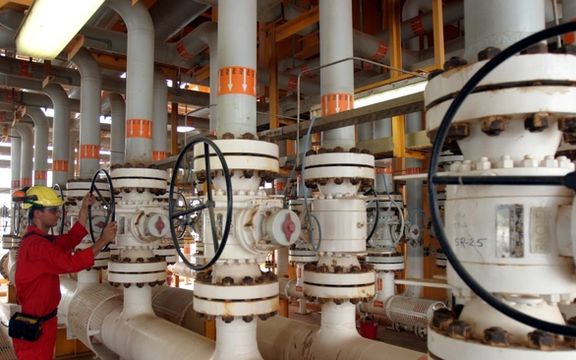
Iran International has obtained information about two oil smugglers, helping to circumvent US sanctions, affiliated with top officials close to Iran's Supreme Leader Ali Khamenei.
The two, Edman Nafrieh (Adman Nafariyeh) and Ali Bayandarian, collaborated with Parsargad Bank to sell millions of dollars' worth of Iranian oil illegally, a common practice for the Islamic Republic meant to circumvent the US sanctions on its oil industry and banking sector.
The operation allegedly took place under the auspices of the Headquarters of Imam's Directive (Executive Headquarters of Imam's Order or simply Setad), a parastatal organization under direct control of the Supreme Leader. A committee known as the "Cover Committee," which includes key figures of Iran’s Supreme National Security Council purportedly issued credit lines to intermediaries for bypassing sanctions.
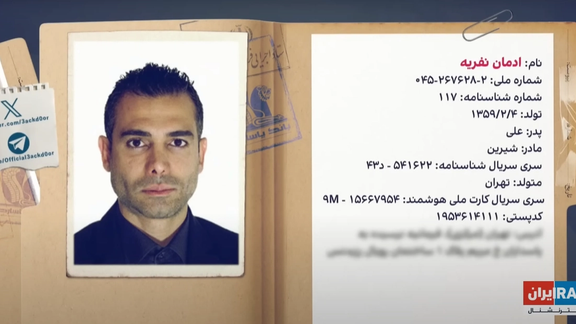
The Islamic Republic has numerous mechanisms in place through a wide range of entities and organizations to sell its oil via third parties to evade sanctions. The country has also started giving oil to state organizations, including the IRGC, as a way to boost their budgets without actually allocating any money to them. Such operations are usually carried out by a network of state bodies and businesspeople with close ties to the regime, who usually gain huge profits in the process. However, with every new administration in office, former assets become a liability and bear the brunt of the political games of the regime.
Edman Nafrieh, 43, who lives in an upmarket part of Tehran, is one of such businesspeople who were trusted by the Setad to sell Iranian oil. His real name, Arman, was changed to Adman in 2007 and later to Adrian, as he gradually whitewashed his Iranian origins. Finally in January last year, he changed his last name to Touran to complete his more Western cover image. Through a network of companies active in the field of energy in Tehran and Dubai, Nafrieh is still active in illegal sales of Iran’s oil as well as bitumen industry.
In one case in 2019, two senior figures of the cover committee – Yahya Alavi and Mohammad Mirmohammadi -- requested Parsargad Bank to issue a $500 million bank guarantee in the name of Nafrieh to sell the oil, which was under the control of the Setad. Apparently, he never paid back about $300 million of the oil sale proceeds.
He was designated by the US in November 2022 along with five other people and 17 entities in a crackdown on a sanctions evasion network that provided support to Iran’s proxy in Lebanon Hezbollah and the Islamic Revolutionary Guard Corps-Qods Force (IRGC-QF).
Ali Bayandarian, another member of the Setad’s oil smuggling network, was also sanctioned by the US in January 2020 as Washington designated four companies accused of purchasing Iranian oil and petrochemical products. Bayandarian was designated over his links to the companies.
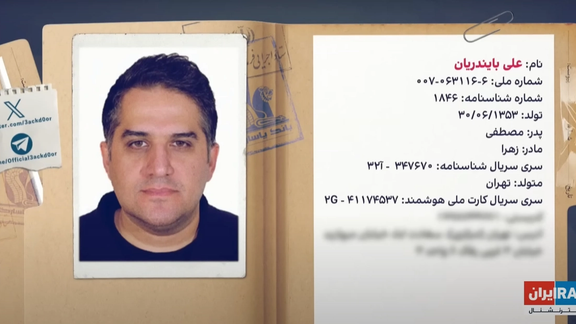
Documents leaked by a cyberattack on the Iranian parliament’s media arm on Tuesday revealed the parliament's coordination with designated Iranian entities and individuals to facilitate their trade activities and conceal their identities and connections from international regulatory bodies.
Nafrieh and Bayandarian are just small cogs in Iran’s huge network in charge of keeping the flow of oil revenues around global sanctions.
Iran’s oil exports have been increasing in recent years, from a low of less than 500,000 barrels per day after the US re-imposed sanctions on Iran in 2019 to as high as over 1,500,000, a rise that regime officials attribute to measures to bypass the punitive measures rather than an honest interaction with the world.
One of the most well-known cases was former tycoon Babak Zanjani, who now faces execution for embezzling the proceeds of oil sales totaling around $3.5 billion. Zanjani was arrested and convicted in 2013 after Hassan Rouhani was elected president, but has always maintained his innocence and that the death sentence passed was "politically motivated."
Zanjani sold Iranian oil on behalf of the NIOC during President Mahmoud Ahmadinejad's second term (2009-13) through an elaborate network of black-market dealers and money-launderers − particularly in the UAE, Turkey and Malaysia. He was subsequently sanctioned by the Council of the European Union in December 2012 and by the United States Treasury in April 2013.
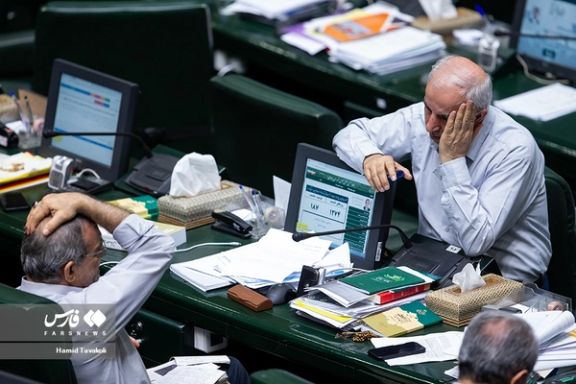
Following a cyber attack on over 600 Iranian government servers, the parliament's voting system broke down during proceedings on Wednesday, MPs resorting to standing and sitting to signify their agreement or disagreement.
The live broadcast of the parliamentary session was also unavailable on the official website due to the malfunctioning of the voting mechanism following Tuesday's cyber attack claimed by the hacktivist group Uprising till Overthrow, closely linked with the Albania-based opposition Mujahideen-e Khalq (MEK) organization.
It is the latest in a series of high level hacking incidents affecting the government and comes on the eve of the country's upcoming elections, scheduled for March 1st, which have witnessed extensive candidate disqualifications and experts expect turnout to be less than 15 percent, a record low for the regime.
Shahriar Heidari, a member of the National Security Commission of the Parliament, highlighted the vulnerability of the country's cyber security infrastructure, saying, "Given that some government systems have been hacked before, and now the parliament has been hacked, it indicates the weakness of the country's cyber security structure."
Leaked documents from the breach include sensitive materials concerning the Supreme National Security Council's strategies to evade sanctions and internal parliamentary documents, such as the list of MPs' salaries which revealed parliamentarians' salaries range from 1.7 to 2.7 billion rials, equivalent to $3200 to $5000.
Meanwhile, Iranian workers are set to receive a government approved average salary increase of 20 percent starting in March, amid an annual inflation rate of around 50 percent. The new minimum monthly wage has been set at 115 million Iranian rials or about 210 US dollars.
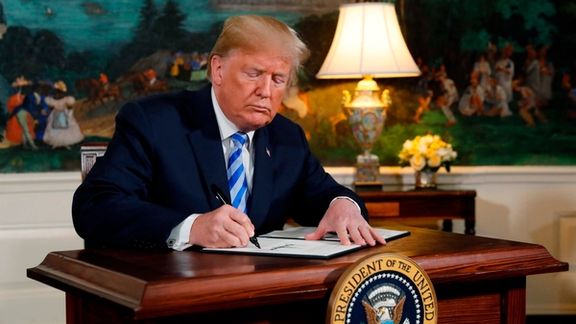
Ruling hardliners in Iran are growing increasingly apprehensive about the possibility of a Republican victory in US presidential elections, leading to a tougher stance towards Tehran.
Among these hardliners, there's notable concern regarding the prospect of Donald Trump making a political comeback. Trump's withdrawal from the 2015 Joint Comprehensive Plan of Action (JCPOA) shattered the hopes of both Iranian hardliners and moderates, who had envisioned reaping benefits from the nuclear deal with the West in exchange for curbing their nuclear ambitions, while expanding their conventional capabilities and regional influence.
Since then, although the Biden Administration has been too kind to Tehran and often turned a blind eye in the face of mischiefs by Tehran, politicians in Tehran still believe that Biden could have done more than giving billions of dollars to Iran in return for releasing US hostages and releasing Iran's frozen assets in South Korea, Iraq and elsewhere.
Supreme Leader Ali Khamenei and his hardline loyalists have little reason to be alarmed by the prospect of President Joe Biden taking tougher action, as they succeeded in convincing his administration to release billions of dollars. They have been led to believe that they can influence the current administration by occasional sabre rattling or by threatening a nuclear escalation, which would be stopped by more concessions from the United States.
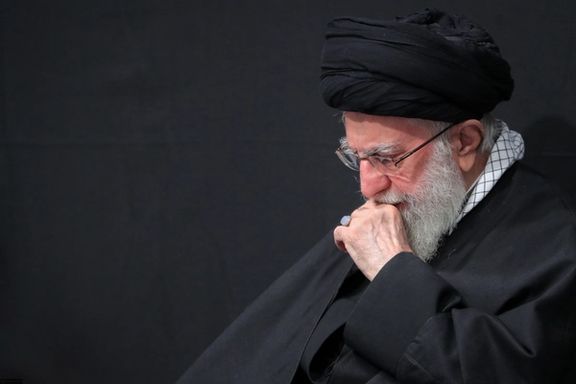
Earlier in this week, former Foreign Minister Ali Akbar Salehi implied that Iran has already surpassed the nuclear threshold.
However, the Iranian Parliament's research center warned the country's top officials including Khamenei about the bleak economic implications of Trump's victory in US elections.
Meanwhile, after a eulogist harshly criticized Iran's moderates and particularly former President Hasan Rouhani for spending too much time and resources to revive the 2015 JCPOA nuclear deal, reformist activist Reza Nasri reminded hardliners that if they had allowed the former government to revive the JCPOA during Biden’s presidency, most of its restrictions would have disappeared in due course.
Nasri further cautioned the ruling hardliners that within a year, Iran's nuclear dossier would be revisited at the UNSC, posing a challenging scenario should Donald Trump or Nikki Haley win the US presidential election. While Trump's foreign policy largely revolved around relations with Ukraine and Russia, Haley has consistently adopted a tough stance on Tehran and its leading clerical figures.
Highlighting the potential repercussions, Nasri warned that Iran's UNSC dossier could adversely impact three generations of Iranians.
Conversely, the Majles Research Center highlighted the concerning trend of Iran's diminishing foreign currency reserves over recent years, likening it to a form of economic disarmament. Warning of potential repercussions, the Center cautioned that a return of Trump to the White House could result in more sanctions, and this will be a shock to the financial markets in Iran. Furthermore, Trump has promised to make a deal with Russia and to focus on harnessing China. In this case, China is likely to reduce oil purchase from Iran and this will further shrink Iran's foreign currency reserve.
Furthermore, the Research Center pointed out another implication of Trump's potential return to the White House: challenges in Iran's economic partnership with Russia. Babak Negahdari, Chairman of the Majles Research Center, underscored the current decline in Iran's economy, evident from the situation of industries in the stock market, and emphasized the looming challenges ahead.
For instance, he highlighted a projected $3.7 billion deficit for importing essential commodities, which would require tapping into foreign currency reserves or the Central Bank. Negahdari warned of the likelihood of increased sanctions against Iran and the resultant shock to financial markets under a Trump presidency, suggesting that despite the Biden Administration's tenure, Iran's economic crisis may persist. He cited Iran's growing reliance on the UAE for marine logistics as a potential threat to food security and financial stability, indicating the pressing challenges facing Iran's economic landscape.
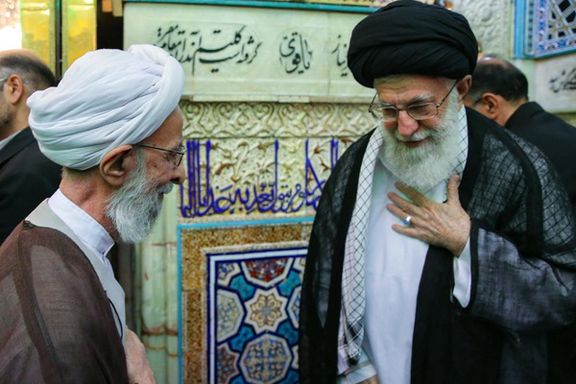
The ayatollah who was the fervent proponent of pure Islamic rule as distinct from the Islamic Republic died in 2021, politicians using his ideology were gaining power in Iran.
Iranians had all but consigned Ayatollah Mohamad Taqi Mesbah-Yazdi to the annals of history. However the ascension of President Ebrahim Raisi to power in 2021, following Mesbah-Yazdi's passing that same year, brought the cleric's influence back into sharp focus. The political landscape of Iran shifted once more as Paydari seized control of the government and parliament.
Prior to the 2010s, Mesbah-Yazdi remained largely obscure, save for his association with populist President Mahmoud Ahmadinejad, whose rise to power was aided by Mesbah-Yazdi's disciples. Those familiar with him understood his contentious relationship with the founder of the Islamic Republic, Ayatollah Ruhollah Khomeini, stemming from Mesbah-Yazdi's early opposition to Khomeini's revolutionary ideals before the 1979 Islamic revolution.
Mesbah Yazdi's reluctance to engage in overt political activities until after Khomeini's demise, likely stemmed from this antagonism. It was only with the ascent of Ali Khamenei to Iran's leadership in 1989 that Mesbah-Yazdi emerged from obscurity, advocating for Khamenei's authority as the direct conduit between God and the populace. Mesbah-Yazdi contended that Khamenei's appointment was divinely ordained, bypassing the need for electoral or popular validation, positioning him akin to a prophet who could transmit God's law without intermediary.

In a recent report about Mesbah-Yazdi, Iran’s Rouydad24 website wrote that Mesbah was born in 1934 in Yazd in central Iran where he later studied at the seminary before leaving for An-Najaf in Iraq to continue his studies. However, he returned to Iran after only one year and continued his studies at the religious school of Ayatollah Boroujerdi and then Ayatollah Khomeini.
It was in Qom that he further developed his theory of pure Islamic (Shiite) state partly in collaboration with former President Akbar Hashemi Rafsanjani and former Judiciary Chief Mohammad Beheshti who later disagreed with his radical totalitarian ideas. Later, he studied at the Haqqani Madrasah, which was established in the 1950s as a place to politicize Shiism. The Madrasah is today notorious for producing some of the most violent militant clerics that ruled in Iran during the first decades of the Islamic Republic.
It was at this Madrasah that Mesbah-Yazdi published a journal named Enteqam [Revenge] which propagated hate speech and violence against the secularist monarchy.
His glorification of violence in the 1990s and 2000s, which led to the mass murder of intellectuals by government agents revealed the practical implication of the school of thought he developed during that period. Coupled with a paranoia about "infiltration" by "others" his ideas turned into something sinister and dangerous. Rouydad24, quoted him as having said in July 2002: "Identify the Satanic mercenary elements. Silence any opposition to the Supreme Leader. If they are ignorant, explain the matter to them, but if they have ill intentions, kill them by strangulating them!"
Despite Mesbah-Yazdi's influence on political rhetoric, particularly within the Paydari Party, his ideas often remained superficially understood, with many adherents prioritizing self-interest over ideological fidelity. The prevailing ethos among Paydari members emphasized personal gain, be it financial resources or political power, often at the expense of Mesbah-Yazdi's original principles. His ideology was and remains a useful tool for those who want to monopolize power using a rallying point.
As Paydari consolidates its grip on Iranian politics, the Islamic Revolutionary Guard Corps (IRGC) emerges as a potential counterbalance. With over 70 IRGC officers reportedly serving in the Majles, including influential figures like Speaker Mohammad Bagher Ghalibaf, they represent a formidable force capable of tempering Paydari's dominance, ensuring a delicate equilibrium within Iran's political arena.
According to one of the latest headcounts, at least 24 top officers of the IRGC were members of the outgoing parliament, including Ghalibaf. They may not represent a large bloc, but their influence is undeniable as Khamenei uses them to counterbalance Paydari.